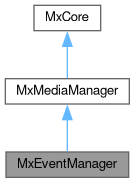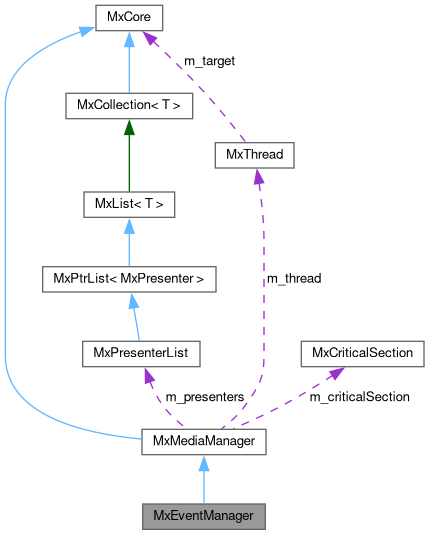MxEventManager is a subclass of MxMediaManager responsible for managing timed event delivery, either via cooperative thread or tickle-based mechanism. More...
#include <mxeventmanager.h>


Public Member Functions | |
| MxEventManager () | |
| Constructor for MxEventManager. More... | |
| ~MxEventManager () override | |
| Destructor for MxEventManager. More... | |
| void | Destroy () override |
| Tears down the event manager and releases resources/thread/registration. More... | |
| virtual MxResult | Create (MxU32 p_frequencyMS, MxBool p_createThread) |
| Initializes the MxEventManager to periodically handle events using a thread or registration with the tickle manager. More... | |
 Public Member Functions inherited from MxMediaManager Public Member Functions inherited from MxMediaManager | |
| MxMediaManager () | |
| [AI] Constructor. More... | |
| ~MxMediaManager () override | |
| [AI] Destructor. More... | |
| MxResult | Tickle () override |
| [AI] Called by the tickle manager to step through and update all presenters, and process their output data. More... | |
| virtual MxResult | Create () |
| [AI] Allocates and initializes the internal presenter list for this manager, ensuring thread safety. More... | |
| virtual void | Destroy () |
| [AI] Destroys all registered presenters and resets the internal state, ensuring safe resource disposal. More... | |
| virtual void | RegisterPresenter (MxPresenter &p_presenter) |
| [AI] Register a new presenter for tickle management and playback coordination. More... | |
| virtual void | UnregisterPresenter (MxPresenter &p_presenter) |
| [AI] Remove a presenter from tickle and managed output lists. More... | |
| virtual void | StopPresenters () |
| [AI] Stops/ends the action on all registered presenters, typically halting all playback and output. More... | |
| MxResult | Init () |
| [AI] Initializes all internal members to their default values. More... | |
 Public Member Functions inherited from MxCore Public Member Functions inherited from MxCore | |
| MxCore () | |
| [AI] Constructs a new MxCore object and assigns it a unique id. More... | |
| virtual | ~MxCore () |
| [AI] Virtual destructor. Required for correct polymorphic cleanup in derived classes. More... | |
| virtual MxLong | Notify (MxParam &p_param) |
| [AI] Virtual callback notification mechanism. More... | |
| virtual MxResult | Tickle () |
| [AI] Called by tickle managers to allow the object to update itself. More... | |
| virtual const char * | ClassName () const |
| [AI] Returns the runtime class name of this object. More... | |
| virtual MxBool | IsA (const char *p_name) const |
| [AI] Checks whether this object's class type or parents match the given name. More... | |
| MxU32 | GetId () |
| [AI] Gets the unique (per-process) id assigned to this object instance. More... | |
Additional Inherited Members | |
 Protected Attributes inherited from MxMediaManager Protected Attributes inherited from MxMediaManager | |
| MxPresenterList * | m_presenters |
| [AI] Pointer to list of currently registered (active) presenters. More... | |
| MxThread * | m_thread |
| [AI] Optional pointer to a worker thread used for media dispatch/IO (if multi-threaded operation is used, otherwise NULL). More... | |
| MxCriticalSection | m_criticalSection |
| [AI] Critical section object used for guarding access to the presenter list and internal members for thread safety. More... | |
Detailed Description
MxEventManager is a subclass of MxMediaManager responsible for managing timed event delivery, either via cooperative thread or tickle-based mechanism.
[AI] Forward declaration for the global event manager responsible for in-game event queueing and dispatch.
[AI]
[AI] MxEventManager coordinates the delivery of "tickles" (periodic updates) to its clients. It supports both threaded and non-threaded operation modes. When in threaded mode, it creates a dedicated MxTickleThread to drive regular tickles at the specified frequency. In non-threaded mode, it registers itself with the global MxTickleManager for update calls. MxEventManager provides initialization, teardown, and resource-control logic, aiming to abstract event (tick) management for the application subsystems, usually presenting media or handling real-time updates. [AI]
Definition at line 14 of file mxeventmanager.h.
Constructor & Destructor Documentation
◆ MxEventManager()
| MxEventManager::MxEventManager | ( | ) |
Constructor for MxEventManager.
[AI]
[AI] Initializes the event manager, setting up internal state and preparing for possible event handling logic. The Init() function is called during construction. [AI]
Definition at line 9 of file mxeventmanager.cpp.
◆ ~MxEventManager()
|
override |
Destructor for MxEventManager.
[AI]
[AI] Cleans up any allocated resources or threads and deregisters itself from tickle management if necessary. Calls Destroy(TRUE). [AI]
Definition at line 15 of file mxeventmanager.cpp.
Member Function Documentation
◆ Create()
Initializes the MxEventManager to periodically handle events using a thread or registration with the tickle manager.
[AI]
- Parameters
-
p_frequencyMS Frequency, in milliseconds, at which to issue tickles/updates. [AI] p_createThread If TRUE, creates a dedicated thread for event ticks. If FALSE, registers with tickle manager to be tickled at specified frequency. [AI]
- Returns
- Returns SUCCESS or FAILURE, depending on resource allocation success and thread or registration initialization. [AI]
[AI] If p_createThread is TRUE, locks the critical section and begins a new MxTickleThread instance to handle tickling. If FALSE, registers this instance as a client with the singleton tickle manager. Destroys instance if initialization fails. [AI]
Definition at line 43 of file mxeventmanager.cpp.
◆ Destroy()
|
overridevirtual |
Tears down the event manager and releases resources/thread/registration.
[AI]
[AI] Calls the internal Destroy(FALSE) routine, which will properly release the tickle thread, deregister from the tickle manager, and destroy base class objects if not from the destructor context. [AI]
Reimplemented from MxMediaManager.
Definition at line 79 of file mxeventmanager.cpp.
The documentation for this class was generated from the following files: